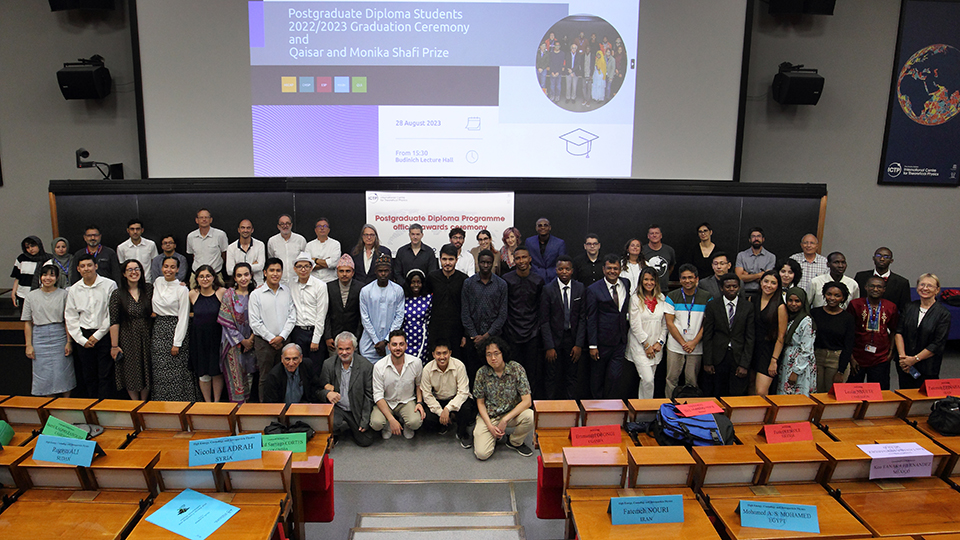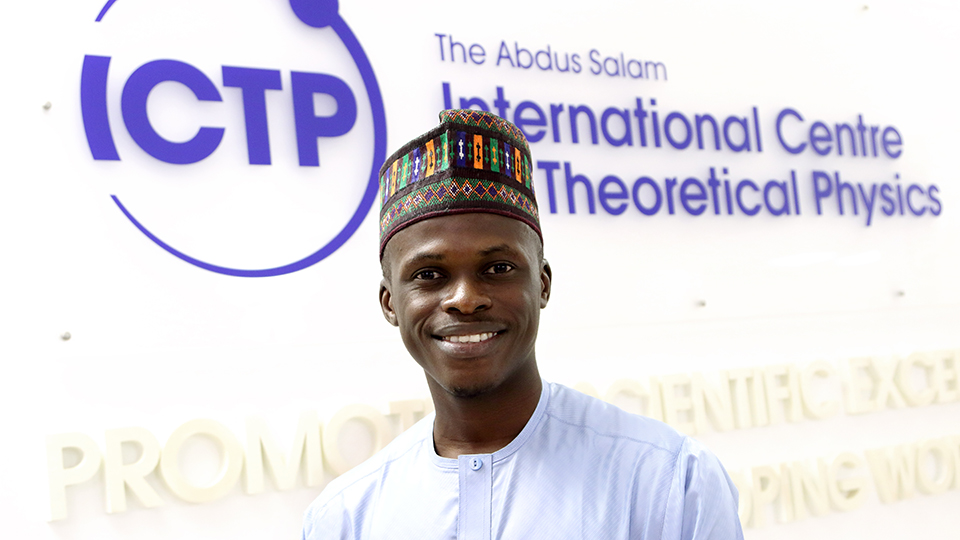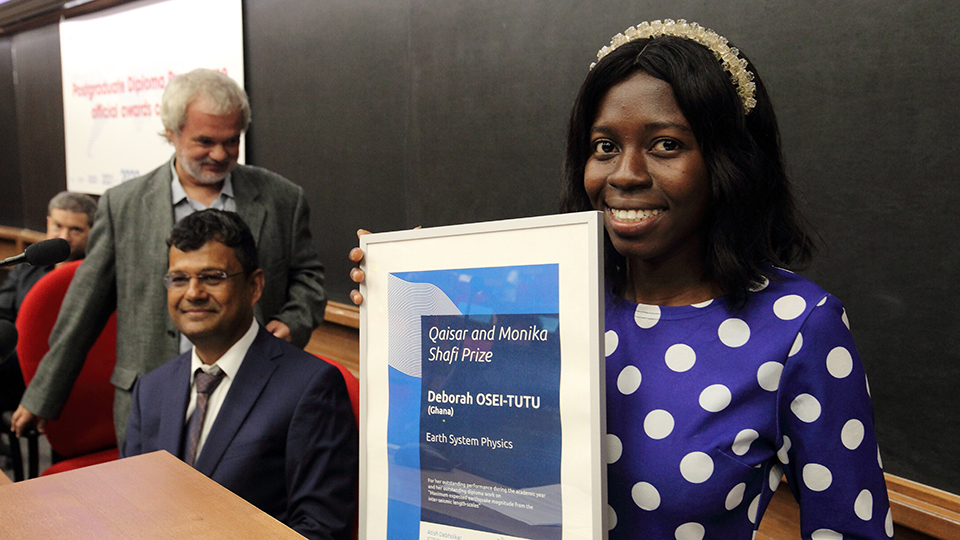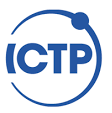
An intense, pre-PhD programme for talented students
Supporting its mission to promote advanced scientific research in developing countries, ICTP offers a Postgraduate Diploma Programme that prepares talented students for PhD studies.
The Postgraduate Diploma Programme started in 1991, and since then, many of its graduates have gone on to do PhDs at various prestigious universities, including in Europe and North America. Many of them, after a few postdoctoral stints abroad, have returned to their home countries, where they are actively involved in teaching and in developing advanced research groups there. Others have pursued scientific careers in leading scientific institutions worldwide. Many former students continue to maintain an active collaboration with ICTP throughout their careers.
The Programme is open to young qualified graduates in physics, mathematics or related fields. A limited number of scholarships (around 10 per field) are awarded to successful candidates from developing countries (with particular emphasis on students from the least developed regions of the world) to cover travel and living expenses during their stay at ICTP. The selection of the candidates is based on their university performance as well as on academic recommendations. The selection committee aims to select the best academically qualified candidates while striving for gender balance and geographical distribution. After the completion of the courses (including examinations), participants are required to work on a dissertation, to be submitted and defended.
High Energy, Cosmology and Astroparticle Physics
-
Coordinator: G. Villadoro
Courses for the academic year 2025-2026
-
LINK TO THE 2025-26 HECAP DIPLOMA LECTURES
I Term September 2025 – January 2026
-
Quantum Mechanics (HEP-QM) K.S. Narain (18 lectures of 1.5 h each) Starting on 8 September 2025
- Lorentz Invariant Classical Field Theory (HEP-LICFT) B. Acharya (10 lectures of 2 h each) Starting on 8 September 2025
- General Relativity I (HEP-GR I) M. Mirbabayi (17 lectures of 1.5 h each) Start date TBC
- Quantum Field Theory I (HEP-QFT I) A. Bissi (20 lectures of 1.5 h each) Start date TBC
-
Tutorials
- Classical Field Theory tutorials (HEP-CFT tut.) -
- Quantum Mechanics tutorials (HEP-QM tut.) - F. Ferrari
- Quantum Field Theory I tutorials (HEP-QFT I tut.) -
- General Relativity I tutorials (HEP-GR I tut.) -
II Term January 2026 - May 2026
- Standard Model I (HEP-SM I) G. Villadoro (21 lectures of 1.5 h each)
- Quantum Field Theory II (HEP-QFT II) S.Randjbar-Daemi (20 lectures of 1.5 each)
- Standard Model II (HEP-SM II) E. Miro’ (21 lectures of 1.5 h each)
- General Relativity II (HEP-GR II) P. Creminelli (21 lectures of 1.5 h each)
- Tutorials
- Standard Model I tutorials (HEP-SM tut.)
- Standard Model II tutorials (HEP-SM II tut.)
- General Relativity II tutorials (HEP-GR II tut.)
- Quantum Field Theory II tutorials (HEP-QF II tut.)
Condensed Matter Physics
-
Coordinator: Nicola Seriani
Courses for the academic year 2025-2026
I Term: September – December 2025
- Mathematical Techniques (CMP-MT) M. Sellitto (12 lectures of 1.5 h each) Starting on 8 September 2025
- Linux Basics (CMP-LB) M. Stella and C. Egan (5 lectures of 1.5 h each) Starting on 9 September 2025
- Numerical Methods I (CMP/ESP-NUM I) E. Coppola, G. Giuliani, Z. Li, D. Bhakuni (18 lectures of 1.5 h each) Start date TBC
- Statistical Mechanics (CMP-SM) A. Jelic (20 lectures of 1.5 h each) Starting on 24 September 2025
- Electrons and Phonons in Solids (CMP-EPS) N. Stojic and N. Binggeli (29 lectures of 1.5 h each) Starting on 15 September 2025
- Advanced Quantum Mechanics (CMP-AQM) R. Fazio and S. Santoro (31 lectures of 1.5 h each) Starting on 24 September 2025
- Selected Topics in Condensed Matter Physics (CMP-ST) N. Seriani + G. Fux (10 lectures of 1.5 h each) Starting on 3 October 2025
-
Tutorials
- Statistical Mechanics tutorials (CMP-SM tut.)
- Electrons and Phonons in Solids (CMP-EPS tut.)
II Term: January – April 2026
- Scientific Python (CMP-SP) I. Davydenkova (20 lectures of 1.5 h each) Starts on Jan 12th 2026
- Numerical Methods II (CMP-NUM II) M. Dalmonte, A. Hassanali (20 lectures of 1.5 h each) Starts on Jan 20th 2026
- Selected Topics in Condensed Matter Physics (CMP-ST) N. Seriani + G. Fux (10 lectures of 1.5 h each) continues from 1st Term from Feb 20th 2026
- Supercondictivity and Magnetism (CMP-SUP) M. Kiselev (14 lectures of 1.5 h each) Starts on March 9th 2026
- Electronic Structure (CMP-ES) R. Gebauer (12 lectures of 1.5 h each) Starts on Feb 3rd 2026
- Advanced Statistical Mechanics (CMP-ASM) A. Scardicchio (12 lectures of 1.5 h each) Starts on Feb 2nd 2026
-
Tutorials
- Advanced Statistical Mechanics tutorials (CMP-ASM tut.)
Mathematics
Coordinator: Pavel Putrov
Courses for the academic year 2025-2026
LINK TO THE 2025-26 MATH DIPLOMA LECTURES
I Term (first trimester)
September 8 - November 8 2025
November 8 to November 23 2025: exams
- Real Analysis (MTH-RA) J. Weigt (20 lectures of 1.5 h each) Starts on 12 September 2025
- Topology (MTH-TOP) D. Zuddas (15 lectures of 1.5 h each) Starts on 9 September 2025
- Algebra (MTH-ALG) L. Goettsche (20 lectures of 1.5 h each) - Starts on 12 September 2025
- Tutorials
- Real Analysis tutorials (MTH-RA tut.) - Abdilaziz Komilov
- Topology tutorials (MTH-TOP tut.) - Hamza Ounesli
- Algebra tutorials (MT-ALG tut.) - Nicolo' Bignami
II Term (second trimester)
November 24 2025 - February 12 2026
February 13 - February 25 2026: exams
The first two courses are mandatory
- Functional Analysis (MTH-FA) E. Carneiro (20 lectures of 1.5 h each) - Starts on 25 November 2025
- Complex Analysis (MTH-CA) A. Marian (20 lectures of 1.5 h each) - Starts on 1 December 2025
then one out of two of the following courses:
- Differential Geometry (MTH-DG) C. Arezzo (20 lectures of 1.5 h each) - Starts on 24 November 2025
- Supervised Machine learning (MTH-SML) J. Barbier (10 lectures of 2 h each) - Starts on 7 January 2026
- Tutorials (approx. 7 tutorials per course)
- Functional Analysis tutorials (MTH-FA tut.) - Ismoilov Tolibjon
- Complex Analysis tutorials (MTH-CA tut.) - Gautam Ajay
- Differential Geometry tutorials (MTH-DG tut.) - Hamza Ounesli
- Supervised Machine Learning (MTH-SML tut.)
III Term (third trimester)
March 1 - April 30 2026
May 1 - May 15 2026: exams
first course is mandatory
- Algebraic Topology (MTH-AT) P. Putrov (15 lectures of 1.5 h each) Starts on March 3rd 2026
then two out of four of the following courses:
- ODE and Dynamical Systems (MTH-ODS) S. Luzzatto (20 lectures of 2 h each) Starts on March 2nd 2026
- Algebraic Geometry (MTH-AG) S. Sinha (20 lectures of 1.5 h each) Starts on February 27th 2026
- Partial Differential Equations (MTH-PDE) G. Bellettini (15 lectures of 1.5 h each) Starts on March 5th 2026
- Representation Theory (MTH-RT) Fernando Rodriguez Villegas (12 lectures of 1.5 h each) Starts on March 3rd 2026
- Tutorials (approx. 7 tutorials per course)
- Partial Differential Equations tutorials (MTH-PDE tut.)
- Algebraic Geometry tutorials (MTH-AG tut.) - Muhammad Awais
- Representation Theory tutorials (MTH-RT)
- Algebraic Topology tutorials (MTH-AT tut.) - Ayush Singh
- Representation Theory tutorials (MTH-RT tut.)
Earth System Physics
Coordinator: Riccardo Farneti
Courses for the academic year 2025-2026
LINK TO THE 2025-26 ESP DIPLOMA LECTURES
I Term September - December 2025
- Wave Physics (ESP-WP) F. Romanelli (12 lectures of 1.5 h each) Starting on 8 September 2025
- Physics of the Earth for Geohazards (ESP-PEG) A. Aoudia (16 lectures of 1.5 h each)
- Thermodynamics and Physics of the Atmosphere (ESP-TPA) A. Tompkins, G. Biagioli (21 lectures of 1.5 h each)
- Geophysical Fluid Dynamics (ESP-GFD) R. Farneti, S. Salon (20 lectures of 1.5 h each)
- Linux Basics (ESP-LB) G. Giuliani (5 lectures of 1.5 h each) Starting on 22 September 2025
- Numerical Methods I (CMP/ESP-NUM I) E. Coppola, G. Giuliani, Z. Li, D. Bhakuni (18 lectures of 1.5 h each) - TBC
II Term January - May 2026
COURSES FOR BOTH GROUPS:
- Scientific Python (ESP/CMP-SP) D. Davydenkova (20 lectures of 1.5 h each)
- Numerical Methods and Data Analysis in GeoScience (ESP-NDA) G. Giuliani, A. Tompkins (22 lectures of 1.5 h each)
CLIMATE
- Atmospheric Dynamics (ESP-AD) F. Kucharski (15 lectures of 1.5 h each)
- Ocean Dynamics (ESP-OD) R. Farneti (17 lectures of 1.5 h each)
- BioGeochemical Cycles (ESP-BGC) C. Solidoro, A. Pozzer (12 lectures of 1.5 h each)
- Earth System Modelling (ESP-ESM) E. Coppola (13 lectures of 1.5 h each)
SOLID EARTH
- Theoretical Seismology (ESP-SEIS) F. Romanelli (9 lectures of 2 h each)
- Space Geodesy and InSAR (ESP-SG) A. Borghi (14 lectures of 1.5 h each)
- Applied Seismology (ESP-APS) S. Parolai (12 lectures of 1.5 h each)
- Physics of Volcanoes (ESP-PV) E. Rivalta (12 lectures of 1.5 h each)
- Mechanics of Earthquakes and Tectonophysics (ESP-MET) A. Aoudia
- Observations and Computer Methods (ESP-OCM) (25 lectures of 1.5 h each)
Quantitative Life Sciences
Coordinator: Matteo Marsili
Courses for the academic year 2025-2026
I Term (September 2025 - February 2026)
- Probability and Information Theory (QLS-PIT) M. Marsili (44 h)
- (QLS-PROB) Minh Tuan Nguyen Course starts on 23 Sept. 2025
- Large Scale Behaviour (QLS-LSB) M. Marsili Course starts on 22 Sept. 2025
- Statistical Mechanics (QLS-SM) Rafna Rafeek (8 lectures of 2 h each = 16 h) Course starts on 3 Nov. 2025
- Biophysics (QLS-BIO) E. Roldan (28 lectures of 1.5 h each = 42 h) Course starts on 14 Oct. 2025
- Ecology and Evolution (QLS-EE) J. Grilli (27 lectures of 2 h each = 54 h) Course starts on 6 Oct. 2025
- Numerical Methods in Python (QLS-PYT) W. Shoemaker, O. Mazzarisi, D. Princepe (6 lectures of 2 h each = 12 h) Course starts on 8 Sept.2025
- Mathematical Methods (QLS-MM) F. Camilli (8 lectures of 2 h each = 16 h) Course starts on 29 Sept. 2025
II Term (February 2025 - June 2026)
- Spring College on the Physics of Complex Systems (60 h)
- Supervised Machine Learning (QLS-SML) J. Barbier (15 lectures of 1.5 h each = 22.5h)
- Reinforcement learning (QLS-RL) A. Celani (21 lectures of 2 h each = 42 h)
- Introdution to Neuroscience (QLS-NEU) A. Treves and A. Ingrosso (12 lectures of 2 h each = 24 h)
- Introduction to Mathematical Economics (QLS-MEC) M. Marsili (6 lectures of 2 h each = 12 h)
Tutors:
- Mauro Pastore (for MM)
- Minh-Toan Nguyen (for SML)

The Postgraduate Diploma Programme is open to young (generally below 28 years of age), qualified graduates from all countries that are members of the United Nations, UNESCO or IAEA. The minimum qualification for applicants is a degree equivalent to an MSc (or an exceptionally good BSc) in physics, mathematics or in a field related to the topics listed below.
The selection of candidates will be based on their university record and on academic recommendations. Since the Postgraduate Diploma Programme is in English, fluency in speaking and writing is an essential qualification.
The applicant is expected to have adequate knowledge of the following topics in the specific field for which he/she is applying:
- For Condensed Matter Physics: solid state physics; quantum mechanics; statistical mechanics; classical mechanics; electrodynamics; mathematical physics.
- For High Energy, Cosmology and Astropartical Physics: classical mechanics; electrodynamics; special theory of relativity; quantum mechanics; statistical mechanics.
- For Earth System Physics: a theoretical background in physics, mathematics or engineering; mathematical methods applied in geophysics and geosciences.
- For Mathematics: basic abstract algebra; elements of real and complex analysis; topology.
- For Quantitative Life Sciences: classical mechanics, thermodynamics and statistical mechanics, mathematical methods for physics, basic programming skills
Tuition-free; 10 yearly scholarships plus travel grant for applicants from developing countries.
In each Postgraduate Diploma Programme, scholarships and travel grants will be awarded to those 10 students selected from developing countries. There are no course fees. Students will receive a scholarship for the entire year of study. A limited number of qualified candidates who meet the same selection criteria as others may attend the courses at their own cost. They must supply written evidence from a funding agency or a banking institution that funds are available for their entire year's stay, and are equal to those offered by the Centre.

In addition to completing an online application form, candidates should upload the following as part of their application:
- Copies of transcripts of university academic records and university degrees in English (The selected candidates will be required to provide originals or certified copies of these documents as well as of their official English translation before he/she can be admitted to the Programme);
- Any certificates or documents that give proof of the student's ability to follow advanced-level courses, study and write scientific literature in the English language;
- Two letters of recommendation, from senior scientists familiar with the applicant's studies and work.
If you have problems with the online application, please contact the Diploma Office at diploma@ictp.it
SECRETARIAT
Ms. Sandra Alimanovic
Programme Assistant
+39 040 2240 4362
Ms. Manuela Schipizza
Programme Assistant
+39 0402240 4487
Frequently Asked Questions

















